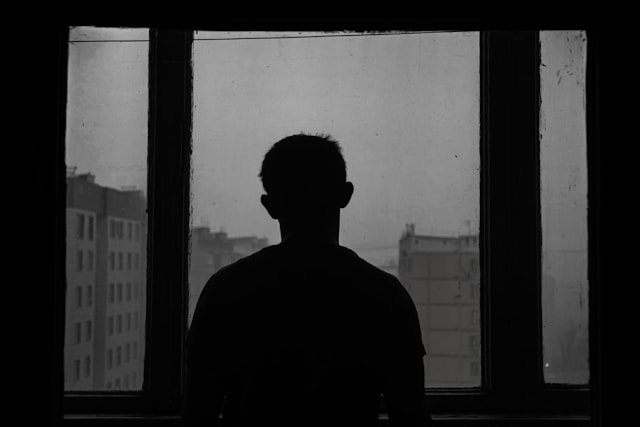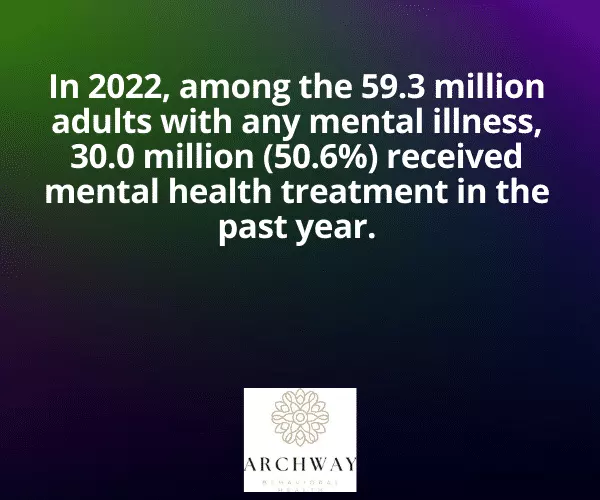Depression is a complex and serious mental health condition that affects millions of people worldwide. It goes beyond occasional sadness and can lead to significant impairment in daily life, relationships, and physical health. According to the National Institute of Mental Health (NIMH), over 21 million adults in the U.S. experience at least one major depressive episode annually.
For some individuals, outpatient therapy and medication management may be enough to manage symptoms. However, for those experiencing severe, treatment-resistant depression or suicidal thoughts, an inpatient depression treatment program may be the best option. Inpatient treatment provides round-the-clock care, structured therapy, and a safe environment for individuals to focus on recovery.
At Archway Behavioral Health, our Mental Health Treatment Center in Florida offers comprehensive, evidence-based depression treatment services, including Cognitive Behavioral Therapy (CBT), Dialectical Behavioral Therapy (DBT), Individual Therapy, and Group Therapy Programs.
This guide will explore:
- When inpatient treatment is necessary
- Types of inpatient depression treatment options
- The benefits of inpatient care
- What to expect during treatment
- How to transition from inpatient to outpatient care
If you or a loved one is struggling with severe depression, this guide will help you understand how inpatient treatment in Florida can provide the support, structure, and care needed for long-term recovery.
Understanding Depression: When Is Inpatient Treatment Necessary?
Depression is more than just a feeling of sadness; it is a serious mental health disorder that affects thoughts, behaviors, and physical well-being.
Symptoms of Major Depression
- Persistent sadness or hopelessness
- Loss of interest in activities once enjoyed
- Fatigue and low energy levels
- Sleep disturbances (insomnia or excessive sleep)
- Changes in appetite and weight
- Difficulty concentrating or making decisions
- Feelings of worthlessness or guilt
- Suicidal thoughts or self-harm behaviors
Who Should Consider Inpatient Depression Treatment?
While outpatient therapy can be effective for mild to moderate depression, inpatient care is often necessary for individuals who:
- Experience severe or recurrent depressive episodes.
- Have suicidal thoughts, self-harm tendencies, or suicide attempts.
- Have co-occurring mental health conditions, such as anxiety disorders, PTSD, or bipolar disorder.
- Have a history of treatment resistance, meaning therapy or medication has not provided adequate relief.
- Require a structured and supportive environment to prevent relapse.
If depression is interfering with daily life and safety, inpatient treatment may be the most effective path toward healing.
Inpatient Depression Treatment Options in Florida
In Florida, inpatient depression treatment programs vary depending on severity, medical needs, and personal circumstances.
1. Residential Treatment for Depression
Residential programs offer 24/7 structured care in a supportive, home-like environment.
What to Expect:
- Intensive, daily therapy sessions, including Individual Therapy and Group Therapy Programs.
- Medication management and psychiatric evaluations to adjust treatment plans as needed.
- Holistic therapies such as art therapy, mindfulness, and fitness programs.
- A long-term treatment approach focusing on emotional healing and coping skills.
This program is ideal for individuals who need immersive care but do not require medical detox or hospital-based psychiatric care.
2. Partial Hospitalization Programs (PHPs) for Depression
A PHP is a step down from residential care but still provides intensive therapy in a structured environment.
What to Expect:
- Individuals attend therapy sessions during the day and return home or to a sober living environment at night.
- Treatment includes CBT, DBT, Individual Therapy, and Group Therapy Programs.
- Focuses on stabilization, skill-building, and medication adjustments.
PHPs are beneficial for individuals transitioning from inpatient care or those who require structured support but can manage some level of independence.
3. Intensive Outpatient Programs (IOPs) for Depression
IOP programs provide flexible, structured therapy several times per week.
What to Expect:
- Therapy sessions 3-5 times per week (morning or evening options).
- Group Therapy to reinforce coping skills and support social connections.
- Ongoing medication management and psychiatric support.
- Designed for individuals returning to work or daily life but needing continued care.
IOPs help individuals maintain long-term recovery while balancing responsibilities.
Key Benefits of Inpatient Depression Treatment
1. 24/7 Support and Crisis Management
One of the most significant benefits of inpatient treatment is constant access to mental health professionals. This ensures:
- Immediate intervention for suicidal thoughts or emotional crises.
- Stabilization in a controlled, safe setting.
- Medical supervision to manage medication adjustments.
2. Evidence-Based Therapies for Depression Recovery
At Archway Behavioral Health, we use proven therapeutic methods to help individuals manage depression.
Cognitive Behavioral Therapy (CBT)
- Teaches individuals how to identify and replace negative thought patterns.
- Helps develop problem-solving skills to cope with stress.
- Promotes behavioral activation to reintroduce enjoyable activities.
Dialectical Behavioral Therapy (DBT)
- Focuses on emotional regulation and distress tolerance.
- Teaches mindfulness skills to reduce anxiety and depression symptoms.
- Helps individuals build healthier interpersonal relationships.
Individual Therapy
- One-on-one sessions to explore trauma, stressors, and personal challenges.
- A personalized approach to treatment based on individual needs.
Group Therapy Programs
- Encourages peer support and connection.
- Provides a safe space to share experiences.
- Teaches coping skills in a supportive environment.
3. Medication Management and Psychiatric Support
For some individuals, antidepressant medications may be helpful. Inpatient treatment allows for:
- Close monitoring of side effects and effectiveness.
- Medication adjustments in a safe environment.
- Holistic alternatives if medication is not the preferred treatment method.
What to Expect During Inpatient Treatment in Florida
1. Initial Assessment and Personalized Treatment Plan
Upon admission, each individual undergoes:
- A psychiatric evaluation to assess mental health needs.
- A physical health assessment to determine medical conditions.
- A personalized treatment plan tailored to goals and progress.
2. Daily Schedule in Inpatient Depression Treatment
A structured routine helps individuals focus on recovery. A typical day includes:
- Morning mindfulness and goal-setting sessions.
- CBT, DBT, and individual therapy throughout the day.
- Group Therapy Programs to reinforce coping skills.
- Recreational and holistic activities (art therapy, yoga, journaling).
- Evening reflection and relaxation exercises.
Transitioning from Inpatient Care to Outpatient Support
Before leaving inpatient care, individuals work with their treatment team to create an aftercare plan, which includes:
- Stepping down to a PHP or IOP for continued therapy.
- Ongoing medication management and psychiatric check-ins.
- Participation in community support groups for long-term success.
At Archway Behavioral Health, we ensure a smooth transition into post-treatment care.
Conclusion
Depression can feel overwhelming, but you don’t have to face it alone. Seeking inpatient depression treatment is a powerful step toward regaining control, restoring hope, and building a healthier future. At Archway Behavioral Health, we provide comprehensive, evidence-based care in a compassionate, structured environment designed to help individuals heal and thrive.
Through Cognitive Behavioral Therapy, Dialectical Behavioral Therapy, Individual Therapy, and Group Therapy Programs, we equip individuals with the tools they need to manage symptoms, develop coping strategies, and maintain long-term emotional well-being. Our experienced team of mental health professionals is dedicated to guiding you through every step of recovery, from crisis intervention to long-term aftercare planning. Call Archway Behavioral Health at 888.488.4103 to speak with a specialist. Depression does not define you. With the right treatment and support, recovery is possible. Let us help you reclaim your life.
Frequently Asked Questions (FAQ)
What is inpatient depression treatment?
Inpatient depression treatment is an intensive, structured program that provides 24/7 professional care for individuals experiencing severe depression, suicidal thoughts, or treatment-resistant symptoms. It includes therapy, medication management, and holistic approaches in a safe and supportive environment.
How do I know if I need inpatient treatment for depression?
You may need inpatient depression treatment if you:
- Experience severe, persistent depressive symptoms that interfere with daily life.
- Have suicidal thoughts or self-harm behaviors.
- Have not responded to outpatient therapy or medication.
- Need a structured, supportive environment to stabilize your mental health.
- Have co-occurring disorders such as anxiety, PTSD, or substance use issues.
What types of inpatient depression treatment programs are available?
- Residential Treatment Program (RTC): 24/7 structured care in a therapeutic environment.
- Partial Hospitalization Program (PHP): Intensive daytime therapy with the ability to return home in the evenings.
- Intensive Outpatient Program (IOP): Structured therapy sessions multiple times per week while maintaining daily responsibilities.
How long does inpatient depression treatment last?
The length of inpatient depression treatment varies depending on individual needs.
- Short-term inpatient programs typically last 2-4 weeks for crisis stabilization.
- Long-term residential programs may last 30-90 days or longer for deeper recovery.
- Aftercare programs (such as IOP or outpatient therapy) help maintain long-term progress.
Can I have visitors during inpatient treatment?
Each facility has different policies, but at Archway Behavioral Health, we encourage family involvement in the recovery process. Family therapy sessions and visitation opportunities may be available based on individual treatment plans.
Will I have to take medication during inpatient depression treatment?
Medication is not required but may be recommended based on a psychiatric evaluation. Our team provides personalized medication management to ensure the best treatment approach for each individual.
What happens after inpatient depression treatment?
After completing inpatient treatment, individuals transition to aftercare programs, such as:
- Intensive Outpatient Program (IOP) for continued therapy and structured support.
- Medication management and psychiatric follow-ups.
- Support groups and community resources to maintain progress.
1How do I start inpatient depression treatment in Florida?
To begin your recovery, call Archway Behavioral Health at 888.488.4103 for a confidential assessment. Our team will help you determine the best level of care based on your needs.



